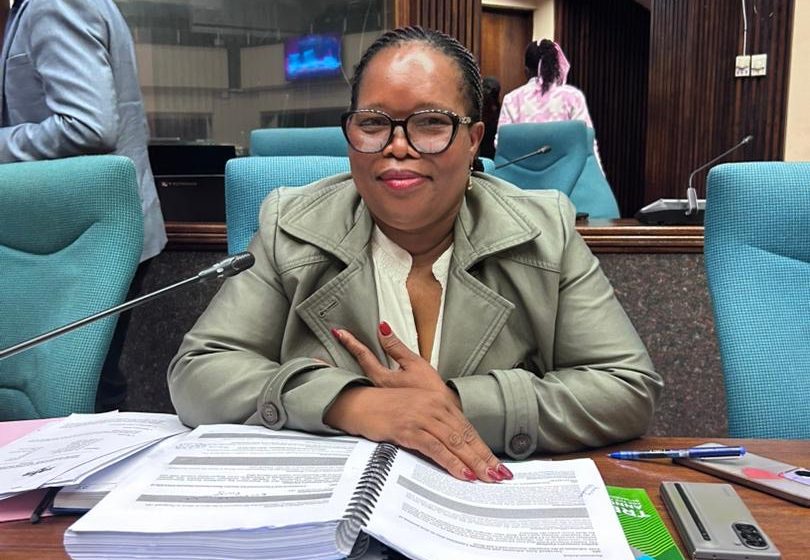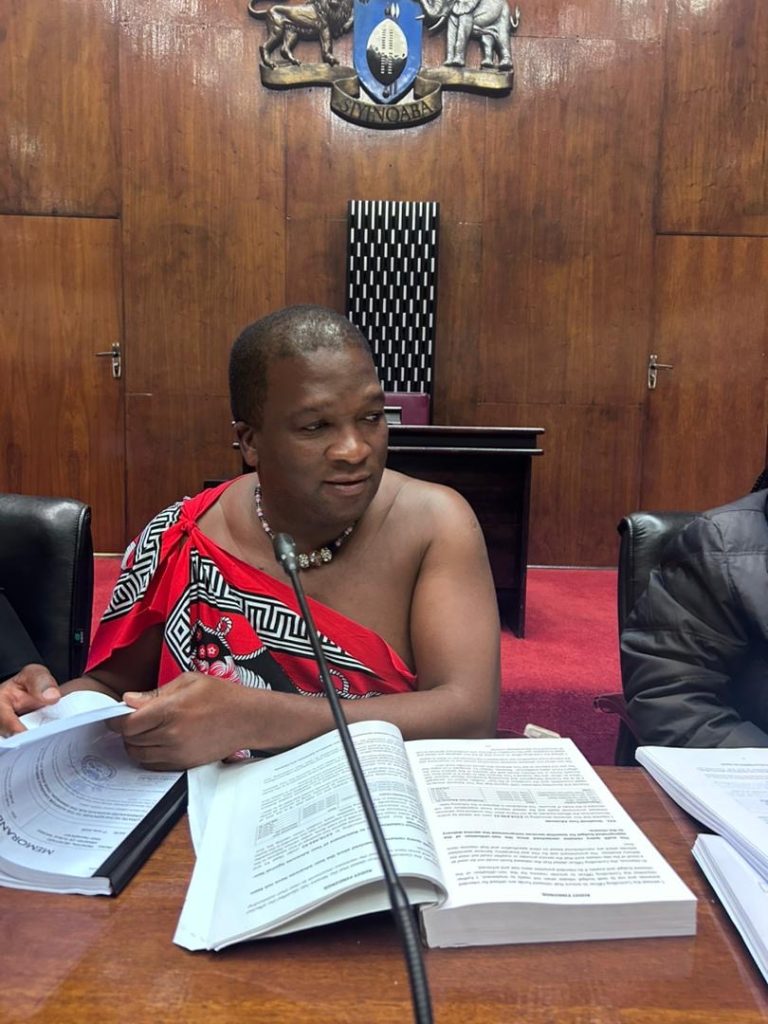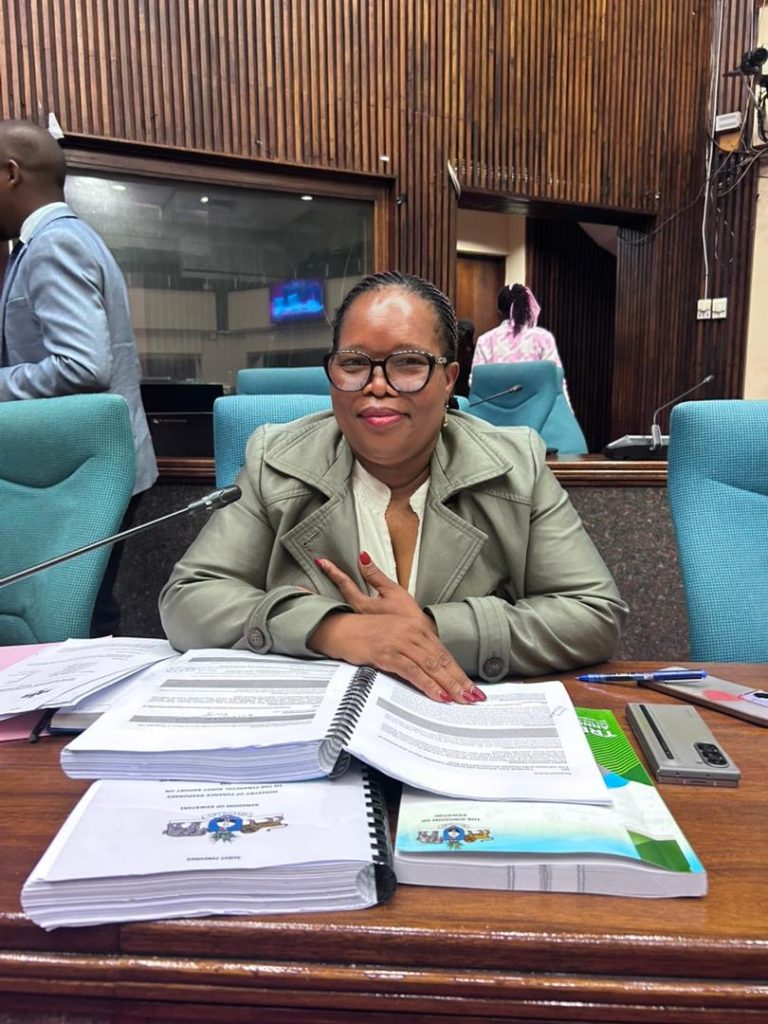
Accountant General Nomsa Simelane
The cost of toothless oversight bodies: Eswatini’s multi-billion accounting scandal Part II
By Zwelethu Dlamini
On June 27, 2025, Inhlase revealed how the Eswatini government is grappling with a decade-long accounting scandal involving E6.5 billion (E6,543,027,330.40) in unresolved discrepancies and misstatements. The investigation revealed a pervasive culture of financial mismanagement, weak oversight, and a striking absence of accountability. Auditor Generals’ reports spanning from 2014 to 2024 have consistently flagged systematic failures, including widespread non-reconciliation of accounts and questionable balances.
These chronic issues persist, with a recent audit uncovering millions of Emalangeni in fresh misstatements, including wrongly reported overdrawn accounts and overstated balances, amounting to E5,242,837.09.
While that investigation exposed the scale of missing funds, this follow-up examines how such massive losses occurred despite multiple oversight bodies—the Public Accounts Committee, Anti-Corruption Commission, and Auditor General’s Office—tasked with preventing exactly this kind of financial misconduct.
The E400 Solution to a Billion-Emalangeni Problem
On paper, Eswatini has no shortage of financial watchdogs. The Public Accounts Committee (PAC), operating under a 1967 Parliamentary Order, scrutinises government spending. The Anti-Corruption Commission (ACC) investigates financial crimes. The Auditor General audits public accounts. Yet despite this elaborate oversight architecture, billions in public funds remain unaccounted for, with far-reaching financial mismanagement characterised by a systemic culture of rogue financial behaviour—misstatements, unauthorised expenditures, and bank balance misalignments that persist year after year.
These bodies remain hampered by inaction and weak legal frameworks, despite consistent warnings of the dire consequences for the nation’s fiscal health and international standing.
The PAC, despite its constitutional mandate to scrutinise public accounts, lacks the legal teeth to force government accounting officials to comply with its recommendations. In its 2024 report to Parliament, PAC Chairman MP Madala Mhlanga highlighted the committee’s limitations.
“Honourable Speaker, despite the Constitution of the country (Act No.1 of 2005) giving Parliament in general the mandate of oversight on the Executive and the PAC in particular powers to conduct oversight on the utilisation of state funds, the Honourable Committee is still hindered in its work due to lack of specific legislation that will outline the powers of the PAC so that it can effectively carry out its mandate,” he stated.
Mhlanga revealed that the last effective legislation governing PAC operations was the Public Accounts Committee Order of 1974, which became ineffective with the coming into force of the Constitution. He stressed that the main challenge lies in enforcing PAC recommendations, which become House resolutions upon adoption. Currently, a controlling officer failing to implement them can be charged with contempt of Parliament under Section 11 of the Parliamentary Privileges Act of 1967.
However, while the charges can act as deterrence, the penalty for not complying with parliamentary resolutions remains laughably inadequate: a maximum fine of E400 or a two-year jail term that has never been successfully enforced.
“Unfortunately, the maximum fine that can be imposed is E400.00 or a jail term of two years (maximum). While in the year 1967 the fine of E400.00 was an annual salary, however these days it is laughable to impose such a fine on someone who misappropriated millions of Emalangeni,” Mhlanga lamented.
He added that the two-year jail term provision is ineffective due to a complex and impractical legal process, and a 2022 parliamentary resolution to strengthen the PAC’s legal powers remains unimplemented. The PAC Chairman expressed deep concern over the government’s financial management and the lack of implementation of critical reforms aimed at enforcing accountability.
Similar sentiments were shared by a former chairperson of the PAC. “During my tenure we raised concerns that E400 no longer deters anyone,” said Deputy Prime Minister Thuli Dladla, former PAC chairperson.
PAC has made over 70 recommendations from 2020 to 2024. Yet repeat offenders remain in office, and no significant reforms have taken place.



An Auditor General Under Siege
Mhlanga also decried the lack of independence of the Auditor General’s Office. He said nearly two decades after constitutional and legislative provisions guaranteed the Auditor General’s independence, it remains under the Ministry of Finance. It lacks financial autonomy, is underfunded, and cannot hire its own staff, severely limiting its ability to conduct thorough audits.
Adding to the challenges, Prime Minister Russell Dlamini publicly questioned the ‘competence of the Auditor General’s Office’ and cast ‘doubt on the reliability of the audit reports.’ The prime minister specifically targeted the AG’s findings on the National Disaster Management Agency (NDMA), where Dlamini was formerly CEO, creating a potential conflict of interest. Such high-level political questioning is a direct attempt to discredit the primary accountability institution, potentially intimidating auditors and undermining public trust in their findings.
Unauthorised expenditure: Performance without Impact
The PAC also raised concerns about billions of Emalangeni in unauthorised expenditure accumulated over the years.
‘Unauthorised expenditures are illegal and the officers who incur them should be disciplined,’ the committee stressed.
Under Section 34 of the Public Finance Management (PFM) Act, 2017, the Ministry of Finance is required to table in Parliament a statement of expenditure at the end of each financial year. This must include:
- Over-expenditures
- Expenditures made without parliamentary approval
- Misuse of allocated funds
- Names of responsible officers
The PAC warned that it would start enforcing this provision in the next financial year and urged the controlling officer to notify all ministries accordingly. In response, the Ministry of Finance has since issued a memorandum informing all line ministries about the PAC’s directive and the upcoming enforcement.
The PAC’s ineffectiveness is glaringly apparent. Its recommendations are consistently ‘ignored or delayed,’ and despite making ‘tough recommendations’ in its reports, there is rarely any evidence of ‘action taken.’ The PAC has been described as a ‘theatre of accountability—performance without impact,’ implying a performative role without genuine enforcement power.
Despite King Mswati III’s consistent calls for a concerted fight against corruption, the agencies remain paralysed.
The direct consequence of this systemic failure of oversight and enforcement is the erosion of transparency and the loss of control over corruption. Transparency International (TI) reports that Eswatini fell 16 points on its Corruption Perception Index (CPI) over the past decade, ranking 130 out of 180 countries. This is worse than 2021 where it scored 32 per cent, placing it on 122/180 countries. Furthermore, Eswatini lost its ‘Control of Corruption rating by the World Bank due to the inaction of anti corruption bodies.’ TI has urged countries with low scores like Eswatini to strengthen institutions that maintain checks and balances over political power, enforce anti-corruption legislation, and support civil society and a free independent media. These declines negatively impact Eswatini’s international standing, potentially deterring foreign investment and donor support.
Modern Standards, Ancient Laws
Despite a legal mandate since 2017, Eswatini has failed to adopt International Public Sector Accounting Standards (IPSAS). This failure keeps the government’s reporting vague, manipulable, and out of sync with global norms, preventing any true understanding of the government’s financial health.
The PMF Act of 2017 legally mandated Eswatini to adopt IPSAS from 2019 onward. However, the government continues to prepare its financial statements using the “outdated 1967 audit framework”. The Auditor General’s reports for both 2023 and 2024 repeatedly state that the current financial reporting “does not conform to any internationally recognised financial reporting framework… and does not present the Government Accounts fairly”.
This persistent failure, despite a clear legal mandate, signals either a profound lack of capacity, a deliberate resistance to transparency, or a combination of both.
Over the years, the Treasury’s excuses for this failure, such as “the Minister hasn’t promulgated the regulations,” highlight bureaucratic inertia or a deliberate delay. In a notable instance of frustration, the PAC fined a controlling officer E400 in 2023. Despite promises for a first IPSAS draft in 2023, it was never completed. On July 4, 2025, when the Accountant General and her team (Treasury department) appeared before the PAC, she said they had now adopted IPSAS and though not completely.
The Ministry of Finance claims the long-promised Integrated Financial Management Information System (IFMIS) will finally eliminate manual errors and enforce accountability.
But the PAC says this has been promised for at least five years. Parliament even approved a budget for it, yet full implementation remains pending. When the accountant general was asked by the PAC about the progress of the IFMIS, she said it was being driven by the Ministry of Finance and such referred questions to the principal secretary. She revealed to Inhlase that her department, as the end user of the IFMIS, was equally frustrated by the delay in rolling out the system, which would improve their work and accounting practices.
Silent Watchdogs: The Anti-Corruption Agencies
Even more concerning is the consistent silence and inaction of the Anti-Corruption Commission (ACC), tasked with enforcement. Parliament estimates that Eswatini loses about E90 million a month, totalling E1.08 billion a year, to corruption, yet the two anti-corruption agencies, set up 15 years ago, remain ‘semi-dormant’. The ACC has ‘never responded to PAC’s findings (2020–2024)’ and has not prosecuted ‘a single case tied to audit findings.’ Its 2022 annual report found prevalent corruption cases involving diverting public funds, disregarding government procurement processes and abuse of public office for personal gain. Even the multi-million health procurement scandal involving fake tenders and bribes that the auditor general exposed was never formally investigated by the ACC, and the main culprits were never brought to book.
The ACC Commissioner has cited a backlog of cases due to a shortage of courts and judicial officers, with 242 corruption cases under investigation in January 2023, and the number has grown to 251 as of January 2025. The commission reported that since the strengthening of operations, six cases have been finalized in the court system.
“A total of 87 cases were investigated and concluded, which were eventually closed. Additionally, two money laundering cases were investigated and finalized. Three cases were referred to other agencies, and two were declined for investigation as they were deemed frivolous,” reported the ACC.
Furthermore, the Commission on Human Rights and Public Administration (CHRPA), established in 2009 and constitutionally empowered to investigate corruption, cannot fulfil this mandate. This is because Parliament has not passed the required legislation to enable it to investigate corruption. The CHRPA is currently limited to investigating human rights abuses and can only recommend solutions for these cases, having not started investigating any corruption matters. The Commission has a multi-pronged mandate as articulated in Section 164 and 243 of the Constitution and the one on corruption reads: “Investigating complaints of injustice, corruption, abuse of power in office and unfair treatment of any person by a public officer in the exercise of official duties”.
The human cost
The consequences of this oversight failure extend far beyond accounting ledgers. Recent newspaper headlines chronicle a healthcare system in systematic collapse: “Declare Health Crisis A National Disaster,” “We Will Downscale Services,” “Patients Queue For 6 Hours,” and most shocking of all, “We Will Only Pray For Patients – Nurses.” These headlines from just two weeks in June-July 2025 reveal a system where E3 billion in health funding exists alongside hospitals that can only treat 20 patients per day and E83 million worth of expired drugs sitting unused.
Meanwhile, not a single official has faced meaningful consequences for financial mismanagement, revealing a system where impunity has become institutionalised.
Regarding the health sector, the PAC Chairman highlighted a critical crisis: despite a generous E3 billion allocation, the sector is in a state of collapse, plagued by drug shortages, delivery failures, and the supply of expired medicine. PAC inspections discovered that over E83 million worth of drugs have expired. The crisis, Mhlanga asserted, is attributed not to funding shortages but to systemic looting and poor accountability.
The root of this dysfunction lies in oversight bodies that remain hampered by inaction and weak legal frameworks, despite consistent warnings of dire consequences for the nation’s fiscal health and international standing.
With these screaming headlines, we need to say no more about the health crisis.



